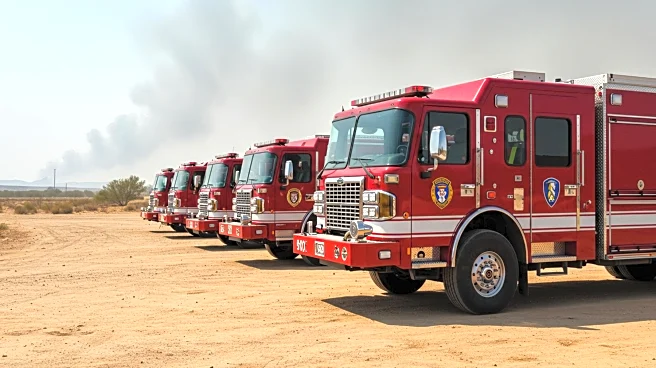What's Happening?
Spain is currently facing one of its most destructive wildfire seasons in recent decades, with several major fires raging across the country. Despite a drop in temperatures, the risk remains high, particularly in the Galicia region. Thousands of firefighters, supported by soldiers and water-bombing aircraft, are actively battling the blazes. The Spanish Interior Ministry has announced the arrival of firefighting units from Germany to assist in controlling the fires. Prime Minister Pedro Sánchez visited the affected areas, acknowledging the role of climate change in exacerbating the situation. The fires have resulted in four fatalities and have burned over 382,000 hectares, which is more than twice the size of metropolitan London. Human activity has been identified as a trigger for many of these fires, with police detaining 23 individuals for suspected arson.
Why It's Important?
The wildfires in Spain highlight the growing impact of climate change on the frequency and intensity of natural disasters. As Europe warms at twice the global average rate, regions like Spain become increasingly vulnerable to such events. The fires have significant implications for public safety, environmental conservation, and economic stability, affecting local communities and agriculture. The involvement of international firefighting units underscores the severity of the situation and the need for cross-border cooperation in disaster management. The Spanish government's response and acknowledgment of climate change's role may influence future policy decisions regarding land management and climate adaptation strategies.
What's Next?
The Spanish government is likely to continue its efforts to control the wildfires, with ongoing support from international partners. Investigations into the causes of the fires, particularly those related to human activity, are expected to intensify. The situation may prompt further discussions on climate change policies and the need for improved land management practices to prevent future disasters. Local communities and environmental groups may advocate for stronger measures to address the underlying causes of the fires and enhance resilience against climate-related challenges.
Beyond the Headlines
The wildfires in Spain may lead to long-term shifts in how the country approaches climate change and disaster preparedness. Ethical considerations regarding land management and the balance between development and conservation could become more prominent. The cultural impact on affected communities, including the loss of historical sites and traditional ways of life, may also be significant. As climate change continues to influence weather patterns, Spain and other countries may need to reassess their strategies for mitigating and adapting to these changes.











